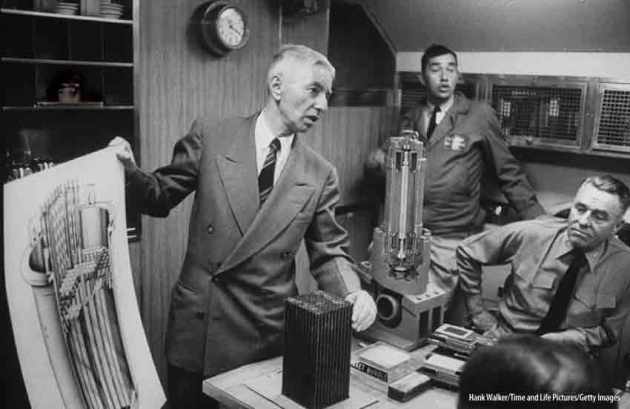Posts Tagged ‘decision-maker’
Don’t Push Out Figures When Facts Are Going in the Opposite Direction

Admiral Hyman Rickover, USN
In addition to investigating new possibilities, effective leaders tend to possess an investigative mindset. Admiral Hyman Rickover (U.S. Navy) stated,
“Sit down before the facts with an open mind. Be prepared to give up every preconceived notion. Follow humbly wherever and to whatever abyss Nature leads, or you learn nothing. Don’t push out figures when facts are going in the opposite direction.”
Peter Drucker described Alfred Sloan (General Motors) in The Effective Executive. “Sloan, was anything but an ‘intuitive’ decision-maker. He always emphasized the need to test opinions against facts and the need to make absolutely sure that one did not start out with the conclusion and then look for the facts that would support it. But he knew that the right decision demands adequate disagreement.”
Meg Whitman (eBay) noted, “My job was to uncover what was going well. I think sometimes when a new senior executive comes into a company, the instinctive thing to do is to find out what’s wrong and fix it. That doesn’t actually work very well.
People are very proud of what they’ve created, and it just feels like you are second-guessing them all the time. You are much more successful coming in and finding out what’s going right and nurturing that. Along the way, you’ll find out what’s going wrong and fix that.”
Other effective leaders used other specific techniques that were extremely beneficial and fruitful, including probing for answers. Irwin Miller (Cummins) was noted for this attribute. “He was a teacher, not by providing answers, but by asking tough questions.
On many occasions his question ‘Ten years from now, what will you wish you had done differently today?’ caused business colleagues, community leaders, friends, and family members to reassess their points of view and reach for higher goals. If you came to tell him what you had already done, he always simply asked, ‘Did you do the right thing?’ ”
Andy Grove (Intel) was also a tough questioner, with an equally strong purpose behind it. “Andy will test his staff endlessly… If someone makes a suggestion, he’ll ask, ‘How would you do that?’ Andy wants answers that are well thought out. Gut feel doesn’t cut it with him. His test is: ‘How would you implement it?’ . . . And he challenges his staff to convince him that a particular direction is the right way to go.’
In some organizations, taking such a rigorous approach and insisting that people be prepared to thoroughly defend their ideas might discourage timid subordinates from offering suggestions – and thus stifle creative thinking. But Grove insists that isn’t really an issue.
‘If it discourages you,’ he says, ‘then you probably had a poor idea that you didn’t have much confidence in – or you are the kind of person who wouldn’t execute the idea anyway. If you can’t be expected to fill out the details of your concept, how can you be expected to execute it? It is almost a test:
‘Do you really believe in your idea well enough to defend it? And, if you are given a go-ahead, will you have enough devotion to it – a serious enough commitment to it – to make it happen?’
Clearly, Andy Grove understands how to make things happen, which helps to explain why Intel has played such a major role in shaping the digital world of the future.’ ”
William Blackie (Caterpillar) used his own power of observation to investigate the facts prior to making key decisions. During the post-Second World War years, replete with growth opportunities for Caterpillar,
“Blackie didn’t make his decisions in some comfortable office. He went out in the field to see for himself and advised others to do the same – even though doing so in the postwar years wasn’t comfortable.
‘Seeing the changes and their effects creates more conviction than being told about it or reading about it,’ he told Iron Age. ‘Therefore, one of the first things I urge any interested or skeptical U.S. businessman to do is to go abroad himself to see what’s going on.’”
Excerpt: Great! What Makes Leaders Great: What They Did, How They Did It and What You Can Learn From It (Majorium Business Press, Stevens Point, WI 2011) Read a Free Chapter
T imothy F. Bednarz, Ph.D. | Author | Publisher | Majorium Business Press
imothy F. Bednarz, Ph.D. | Author | Publisher | Majorium Business Press
Author of Great! What Makes Leaders Great: What They Did, How They Did It and What You Can Learn From It (Finalist – 2011 Foreword Reviews‘ Book of the Year)
Linkedin | Facebook | Twitter | Web| Blog | Catalog |800.654.4935 | 715.342.1018
Copyright © 2012 Timothy F. Bednarz, All Rights Reserved




